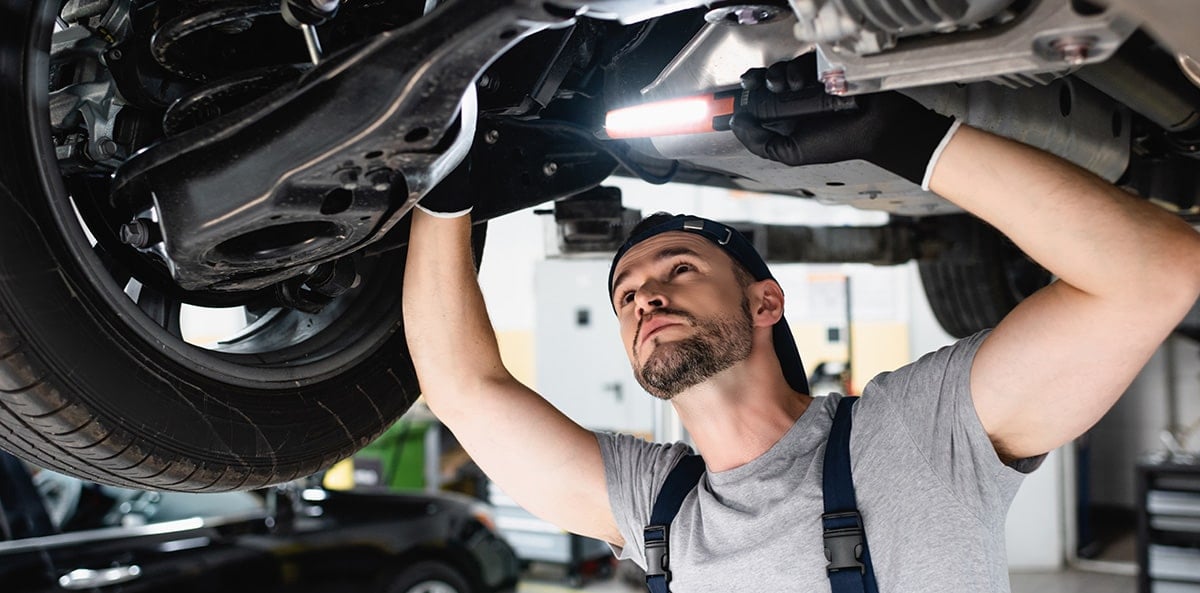How to start a mechanic shop that is profitable

Getting to make your own business decisions, dictating your work schedule, and being able to build something very profitable are all big pluses for potential entrepreneurs.
But it takes more than technical skills to start a successful shop. You’ll need hard work, preparation, and a clear vision. Here’s a step-by-step roadmap of how to go from “I’ve got an idea” to full-fledged auto shop owner.
- Create a detailed business plan
- Understand and protect against risks
- Secure financing
- Identify your ideal customers
- Purchase essential equipment
- Setup of your garage
- Market strategically
- Launch and optimize your operations
- Build your reputation
- Plan for growth
- Get coverage built for your mechanic business with Insureon
Create a detailed business plan
If you’ve ever stopped at the grocery store without a shopping list, there’s a good chance you forgot something, missed a coupon, or just ended up with a cartful of cookies.
The same is true when starting your own shop. Creating a well-thought-out business plan will help you identify the who, what, when, where, and why of your auto repair business before you jump into action.
Here are a few key pieces to include in your auto repair shop business plan:
Executive summary
This is the part where you establish the basics and core details to set the foundation for what you’d like to build. Be sure to include:
- Your business name and brand identity, including logo and tagline
- A mission statement explaining your shop’s purpose
- A detailed list of products and services you plan to offer
- The location you have in mind and the size of the space
- Total number of employees you’ll need to get started
- Short- and long-term financial projections
Market research
Now’s the time to get to know the state of the auto repair industry. Take a look at your local competitors to understand who you’re going up against. Observe their space, identify their customers, and determine what they charge.
You'll also want to include pricing for your services and products. Whether you’re offering oil changes or specialty engine repair services, it’s important to set prices that are competitive without undercutting your expertise and time.
Legal structure
Before you can register your business as a legal entity and obtain the proper license, you need to know what type of business structure you want. How you structure your business can have tax and legal implications, so it’s important to understand your options:
- Ideal for one-person shops, a sole proprietorship is the cheapest and easiest business structure to get going. However, it offers the least amount of legal protection against your personal assets, which can be risky if someone sues you.
- As the most popular option for auto shop owners, a limited liability company (LLC) keeps your personal and business assets separate, so your personal finances are protected if a customer sues you. But it’s important to note that there are some added fees and paperwork involved in this option.
- If you’re co-owning the shop with one or more people, a partnership makes everything equal, ensuring everyone contributes to the business and shares in profits and losses.
- An S corporation (S-corp) allows you to incorporate your operations the way larger companies do, without being taxed twice (the way they are). Depending on how much money you make, there can be tax benefits with this option.
Once you officially register your auto repair services business, you’ll receive an employer identification number (EIN) from the IRS. An EIN can help reduce identity theft risk, streamline how you do your taxes, and make it easier to open a business bank account.

Understand and protect against risks
From slips, spills, and sparks to sharp edges and heavy equipment, an auto shop is filled with potential hazards. Identifying risks and prioritizing the safety of your employees and customers can help you keep things running smoothly—and safely.
Provide safety training
To avoid penalties and ensure your shop is a safe workplace, it’s important to educate all of your employees on Occupational Safety and Health Administration (OSHA) standards for auto repair shops. The list of employee safety regulations includes:
- Training on the hazards of chemicals and materials they work with
- Guidance on personal protective equipment (PPE), including safety glasses, gloves, and hearing protection
- Teaching proper usage of lifts, hoists, tools, and other machinery
- Educating on workspace safety, such as keeping floors clean and clutter-free, wiping up spills quickly, and making sure tools and equipment are organized and put away when not in use
Identify key risks
Understanding the most common risks in your auto shop can help you implement safer work processes and ensure employees know what to do in case of an accident or injury. Some of the most common risks include:
- Workplace injuries from heavy equipment, hazardous chemicals, loud machinery, and slippery surfaces
- Property damage to customers’ vehicles, their personal property, and your tools and equipment
- Service errors, such as misdiagnosing a problem, mishandling parts, or damage caused to a vehicle by using faulty equipment or the wrong parts
Protect your investment
From injuries and accidents to lawsuits, having proper insurance coverage can safeguard your auto shop and provide you with the peace of mind that you have back-up if something happens. These are the policies that are highly recommended for auto shop owners:
General liability insurance
Having a general liability insurance policy not only provides your business with protection against common auto mechanic business risks and lawsuits, but it’s also typically required to sign a commercial lease for shop space.
General liability helps pay for repairs, medical bills, and legal fees related to:
- Customer injuries, such as slipping on a wet floor
- Customer property damage, for example, if an employee breaks a pair of sunglasses inside the vehicle they’re servicing
- Advertising injuries, such as slander and copyright infringement
Auto repair shop owners should also consider these options:
- Garage liability insurance extends your general liability protection to incidents that occur in your garage.
- Garage keepers insurance covers costs if a customer’s vehicle is stolen or damaged while in your care.
Commercial auto insurance
If you purchase a service van for your mobile mechanic business, or your auto repair shop owns a vehicle to run work-related errands, or a tow truck for transporting customers’ vehicles, you’re legally required to get a commercial auto insurance policy in most states.
Having this policy will help cover the cost of injuries and property damage caused by your shop’s vehicle, as well as repairs to business vehicles damaged by weather or vandalism.
Tools & equipment coverage
Once you’ve purchased all of the necessary equipment and tools, you’ll want to protect your investment in case they’re damaged or stolen, or they break down. There are two types of coverage to consider:
- Tools and equipment insurance is a type of inland marine insurance that helps pay for repairing or replacing tools and equipment that are lost, damaged, or stolen. The property usually needs to be less than five years old and valued under $10,000.
- Adding equipment breakdown coverage as an endorsement to your commercial property insurance or business owner's policy gives you financial coverage when your auto repair equipment or machinery malfunctions or has a mechanical failure.
Workers’ compensation insurance
If you’re hiring staff at your new business, workers’ compensation insurance is highly recommended—and required in many states.
A workers’ comp policy will cover costs for:
- Medical expenses from work-related injuries and illnesses
- Wage supplementation during recovery time
- Legal fees, court costs, and settlements if you’re sued by an employee
Even if you’re a one-person repair service, you should consider getting a workers’ comp policy, as health insurance can deny claims for job-related injuries.
Business owner's policy (BOP)
Whether you own or rent a space for your shop, a business owner’s policy (BOP) is a cost-effective way to get both general liability and property insurance. This bundled policy typically costs less than purchasing each policy individually and helps to cover:
- Customer injuries
- Damage to your shop
- Incidents like fires and burglaries
Other recommended insurance policies
Depending on the types of services you’re offering and whether you hire employees, here are some additional business insurance policies to consider:
- Errors and omissions insurance (E&O), also called professional liability insurance, pays for lawsuits related to professional mistakes and oversights, such as misdiagnosing an issue.
- Business interruption insurance is often included in a business owner's policy (BOP), which covers lost income and other costs when your shop is forced to close temporarily due to a fire, storm, or other covered property claim.
- Commercial crime insurance financially protects your business from criminal acts committed by employees against customers or clients, such as an employee stealing from a customer or client.
- Cyber insurance can help your business recover from financial losses caused by a data breach. If you store credit card numbers and other sensitive customer information, this policy is advised.

Secure financing
From new equipment to employee salaries, physical space, and rent, starting your own shop comes with a pretty hefty price tag. Small Business Administration (SBA) loans can help you secure better terms and interest rates, as well as help you pay for shop equipment, supplies, and physical space.
If you need a business loan for this endeavor, you’ll need to provide lenders with a clear outline of your start-up costs, where those funds will go, and how you plan to pay them back. You should also provide a financial forecast for the first five years, including:
- Projected income statements
- Balance sheets
- Cash flow statements
- Expenses, including equipment purchases
- Employee wages
- Supplies
- Monthly rent if you sign a commercial lease for a space
Providing potential lenders with all of these details shows them you’re serious, ambitious, and ready to make your auto shop a profitable investment.
Identify your ideal customers
Determining your target clientele will allow you to tailor your services, improve your margins, and run a smoother operation. Depending on your expertise, location, and budget, you may choose to work with:
- Everyday drivers who own or lease a car usually come in for standard vehicle repairs and service maintenance.
- Businesses with a few vehicles or an entire fleet of trucks typically need quick repairs, cost-effective services, and regular maintenance.
- Specialty vehicle owners who may require specialized services and expertise for their classic, sports, or luxury cars.
Purchase essential equipment
Keeping your shop stocked is the key to success. Here’s a list of the must-have tools and equipment your repair business will need to get started:
- Hand tools, including wrench and socket sets, screwdrivers, pliers, hammers, mallets, and break bars
- Power tools, such as lifts, air compressors, jacks and jack lifts, power drains, work lights, and battery chargers
- Diagnostic tools like vehicle lifts, diagnostic scanners, battery testers, and fuel pressure gauges
- Safety equipment, including glasses, toolboxes, and proper waste disposal systems
Setup of your garage
Design for success
Creating a shop layout that’s organized, well-stocked, and easy to move around in will boost efficiency and optimize your team’s workflow.
Build a dream team
Hiring qualified, certified mechanics and friendly, skilled office staff will improve output and customer service.
Make admin easier
Using an accountant or CPA, a professional bookkeeper, or bookkeeping software will help you accurately handle finances, expenses, revenue, and profitability.
Upgrade inventory
Implementing an inventory management system will make it easier to track inventory and order supplies and parts on time.
Prioritizing reliability, quality, and transparency will help earn customers’ trust and establish a solid reputation in the community.
Market strategically
To attract potential customers, you must have a clear marketing strategy. Establishing an online presence for your business can help you reach a wider audience in a variety of ways, including:
- Launching a website to explain your services, pricing, work experience, plus your phone number and address
- Claiming your business on Google Business Profile, Yelp, and other related online directories
- Setting up a business profile on Facebook, Instagram, and other social media apps to share tips, customer reviews, and before-and-after photos
- Offering customer referral programs and collecting positive customer reviews
- Adding your brand logo and phone number to shop-owned vehicles and service trucks
Launch and optimize your operations
Once your doors are officially opened, you must be ready to provide quality service to many customers—often at the same time.
- Set up shop management software to accurately track repairs, inventory, and customer records.
- Be transparent about your prices to earn customers’ trust, including detailed invoices that explain flat rates, hourly labor costs, and options for service bundles or other savings.
- Establish a customer service protocol that ensures clear, honest communication with every client, from diagnoses and estimates to post-job follow-ups.
Build your reputation
Now’s the time to build up your name and start generating repeat business and word-of-mouth referrals. Prioritizing reliability, quality, and transparency will help earn customers’ trust and establish a solid reputation in the community.
Creating a loyalty program and offering value-adds, such as detailed vehicle inspections and maintenance reminders, will show customers you care and can make their lives easier.
Acknowledging all feedback—good and bad—shows people you're dedicated to the quality of their experience and are always looking to improve.
Plan for growth
It’s important to start making room for more cars on the highway before traffic comes to a standstill. Planning ways to expand your business will allow for smoother growth and greater profitability. A few options to consider:
- Hire a technician or an office administrator so you have more time to focus on business strategies
- Expand your service offerings based on the common needs you see arising from customers
- Explore tools to boost efficiency, such as scheduling software and better inventory management systems
How to launch your own auto repair business
[video: an animated header displays the Insureon logo. Underneath it, a subheading displays the text: "How to start a mechanic shop"]
MALE VOICEOVER: Want to start your own mechanic shop? Whether you want to work on cars at a customers’ location or open your own full-service garage, with the right planning, you can build a profitable business that protects your work, your tools, and your future.
First, decide what kind of shop you want to run. A mobile repair service, where you travel to customers with a basic tool setup or a traditional repair shop with dedicated bays, lifts, and full diagnostic equipment.
[video: an illustrated header displays the text: "Choose a business model:"]
[video: Under above header, two bullet points display the text: "Mobile repair: low startup cost, flexible operations"; "Traditional shop: higher startup cost, better earning potential"]
AStartup costs vary widely, but a small mechanic shop can cost anywhere from $50,000 to over $300,000 while mobile mechanics may only spend $5,000 to $20,000.
[video: an illustrated header displays the text: "How much does it cost?"]
[video: Under above header, two bullet points display the text: "Small garage: ~$50,000-$300,000"; "Mobile mechanic: ~$5,000-20,000"]
Once you choose your model, you’ll need to register your business and follow local regulations. You may also have to meet continuing education requirements, reinsurance agreements, and more.
[video: an illustrated header displays the text: "Legal steps and licensing can include:"]
[video: Under above header, three bullet points display the text: "State and local licenses"; "Waste oil and environmental handling permits"; "Zoning approval for your workspace"]
Specializing in a niche can help new mechanic shops grow faster. Whether it’s diesel repair, hybrid and EV service, or fleet maintenance, finding your specialty helps customers know exactly why they should choose you.
[video: an illustrated header displays the text: "Niche services can include:"]
[video: Under above header, three bullet points display the text: "Diesel repair"; "Hybrid and EV service"; "Fleet maintenance"]
Repair shops work with heavy equipment, hazardous fluids, and customer property, so insurance is essential. Most auto garages need general liability, garage liability, garage keepers, commercial property, workers’ comp, and commercial auto.
[video: an illustrated header displays the text: "Key policies for garages:"]
[video: Under above header, five bullet points display the text: "General liability"; "Garage liability / Garage keepers"; "Commercial property"; "Workers' comp"; "Commercial auto"]
A well-run mechanic shop can be highly profitable. Labor margins are strong, maintenance demand is stable, and loyal customers can keep your bays full year-round.
And when you’re ready to protect your business, Insureon makes it easy. We help small business owners get the right, most affordable coverage in minutes, so you can focus on building an auto shop you’re proud of.
[video: an illustrated header displays the text: "Insureon is the #1 digital agency for small business insurance."]
Get free quotes for your automotive repair business with Insureon today. Click the link to get started.
[video: an animated header displays the Insureon logo]
Get coverage built for your mechanic business with Insureon
Get free quotes from top-rated insurance providers by filling out our easy online application. You can also speak with a licensed insurance agent, who can answer questions and help you find affordable coverage.
Once you find the right policies for your small business, you can begin coverage in less than 24 hours and get a certificate of insurance (COI) for your small business.
Julie Watt, Content Editor
Julie writes blog posts and site content that breaks down complex topics, provides expert advice, and helps connect small business owners with the best insurance solutions. Before joining the Insureon team, Julie worked as a copywriter and content strategist for ad agencies and in-house creative marketing teams to bring brand stories to life and connect loyal consumers with quality products. She’s built and led copy teams at companies such as T.J.Maxx, Amazon, and BISSELL.










